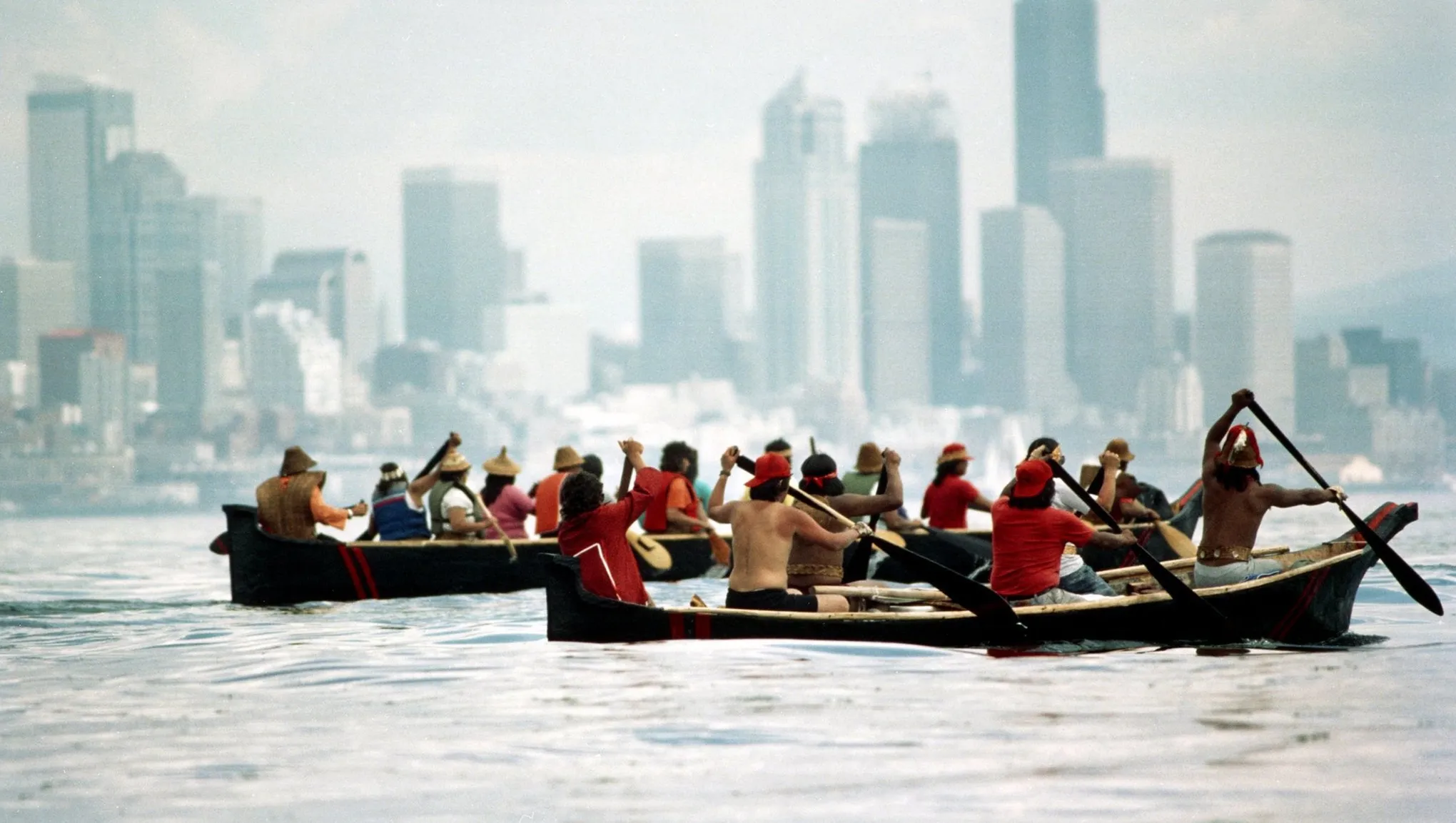
Stonington Gallery is celebrating the 2023 Tribal Canoe Journey in a special group exhibition titled The Power of Water. For June and July we will feature new artworks from our many talented artists working in various mediums exploring the traditions surrounding the Indigenous canoe culture and the precious water that allows it, and us, to survive and thrive.
We’re excited to present these new water centered works to you along with some background information on the origins of the Intertribal Canoe Journey. We hope you will join us in celebrating the return of this important event and the meaningful work of our incredible artists.
The History of the Canoe Journey
Canoes have always been an important facet of Pacific Northwest Coast Native culture. The peoples of this region have relied on water as a means of livelihood for thousands of years. The many rivers and inlets of the coast were major thoroughfares for travel and trade, as well as allowing people to gather together and learn from each other’s knowledge. The water had also been a bountiful source of food and materials needed to survive day-to-day. Many traditions along with fishing and canoe culture became difficult to practice under the oppression of the United States and Canadian governments specifically during the late 19th century. It wasn’t until 1978 in the USA with the American Indian Religious Freedom Act that the possibility of canoeing traditions could be fully revived.
The 1989 Revival of Canoe Traditions
The Seattle Times reported that many Native communities, due to the government’s systemic cultural oppression, had not built or engaged with ceremonial Tribal canoes for 50-60 years before 1989, when Quinault elder Emmett Oliver convinced then-governor of Washington, Booth Gardner, to include canoes in Washington state’s centennial celebration. Eight canoes were commissioned and several First Nations tribes, including some residing in Canada, were invited to “Paddle to Seattle” (the original name given to the event) in the summer of ‘89.
This momentous occasion sparked a revival in canoe culture amongst the Indigenous peoples across the Pacific Northwest, where now every year a different tribe along the coast will host the Canoe Journey and welcome other tribes to their shores.
This year’s event is the first after a hiatus during the pandemic years and will be hosted by the Muckleshoot Tribe, where thousands of paddlers and visitors will be welcomed onto the shores of the central Puget Sound.
What Happens During the Canoe Journey
For some canoe families, the Canoe Journey starts over a month in advance. Many groups must travel long distances to get to the shores of the host tribe in time for the landing date. Tribes from up and down the Pacific Northwest Coast in Washington, Oregon, British Columbia, and Alaska have participated. As the canoe families make their way to the host destination, they are welcomed to the shores of other participating tribes to rest, learn their traditions, and share some of their own.
Once the canoe enters the host tribe’s waters, protocol begins. It is customary to wait with paddles facing upwards as a way of asking permission to land ashore. They will do this until they are invited to shore, sometimes waiting hours. This is part of ancient tradition as a way of honoring and respecting the other nation they are visiting. For a whole week, tribes will take turns sharing their knowledge, which includes each tribe’s traditional songs and dances. This ceremony that stretches out over many days is known as “protocol.”
Canoe families and spectators will share food together, discuss important topics facing their communities, and enjoy each other’s company.
Canoe Journey 2023: Paddle to Muckleshoot
Host: The Muckleshoot Tribe
Landing Date: July 30th
Protocol: July 31st – August 6th
Official Theme: Honoring Our Warriors Past and Present
Stonington’s exhibition celebrating and reflecting this event, The Power of Water, will feature a diverse group of work that explores not only the traditions of the Canoe Journey event but touches on the meaning behind this wonderful gathering: reconnecting with vibrant cultural traditions rooted in honoring the water. We’re really looking forward to the next two months of art, travel, and ceremony!
